Text
I think that you make good points. It's a lot about the access of the resources rather than the students themselves that make the quality of an educational experience. Not to mention that this system created by the principal seems so unbelievably arbitrary, which further proves that point.
Assassination Classroom (S1 1, 5, 16, S2 11) Reflection
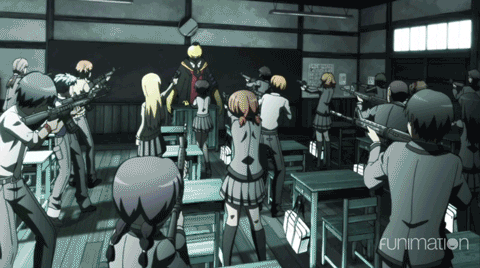
I'm not gonna lie. I'm not really in the best state of mind to be talking about anime right now when I've spent the past 13+ hours brainrotting and feeling violently ill over This One Other Thing but this is the last one... So I'll do it anyways. God this tastes terrible but I'll do it for you [sacrifices].
I can't remember if I watched the entirety of Assassination Classroom before, but I do believe I read all of the manga when I was in elementary school. The story follows Class E's journey as they try to assassinate their yellow octopus teacher, Koro sensei. They don't understand why the government would ask this of them, but they stop questioning once they hear the reward: 10 billion yen. As students accepted to be societal rejects and with no inherent value for the sole reason of not being good at school, this bounty money seems like the only chance they have at accomplishing something with their lives when no one else believes in their ability to accomplish great things in life. Unsurprisingly, hilarity and shenanigans ensue, along with some interesting notes about students who are failed by the education system and prejudice.
It's very clear to see the educational discrimination that occurs in Assassination Classroom between members of Class E and the rest of the school. They're thought to be the lowest of the low for not achieving high enough grades in school, to the point of being completely alienated by the rest of their peers. Their inability to perform as well in school is treated like a contractable disease that encourages all the other "good" students to stay away until they are inevitably sent away to the old campus on top of the mountain and effectively "abandoned" by the education system. In the eyes of the principal, Class E is a scapegoat to encourage competitive and high-achieving students in the main campus to do even better as to not fall to the same level as the "failures". In doing so, Class E was almost completely deprived of an opportunity to properly learn with teachers who cared about their educational growth. Faced with the constant repetition that their efforts will always amount to nothing, just about all of the class had given up and accepted their fate. However, they were able to find their drive to succeed and push past the prejudices with Koro sensei's help, all because he believed in their ability to persevere and learn despite all these extraordinary circumstances pushing back at them.
26 notes
·
View notes
Text
Ass Class

I really like the Juxtaposition between the yellow octopus, Koro-sensei, and the principal. The principal follows the hardline, strict policy of teaching, while Koro-sensei implements a more friendly and intuitive way to have the students "experience the information" rather than try to cram it inside their brains.
Classism:
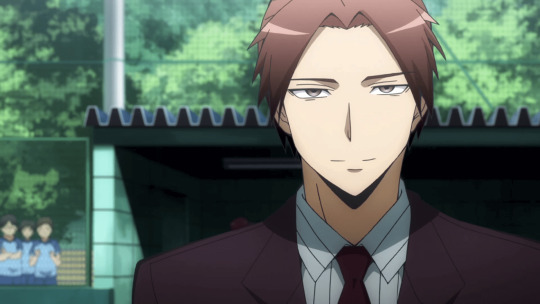
The principal agrees with the old-style method of: there needs to be classes or else nothing will be accomplished. As long there is classes, there will be struggle, and then things will be accomplished and there will be action. However, if there are no classes, then there shall be no motivation and nothing will get done. And I guess we will be stuck living in the endless everyday. In someways, we can view this as the principal's attempt at bringing back a "grand narrative" style of education. Legitimate the hate of the E class, and accomplish great things as the top of the class, as you should be. I do agree in some cases that classes will never be abolished, (because so many people have tried) it for sure does not mean that you must drive them with the power of hatred in order to perform a task.
Gemeinschaft:
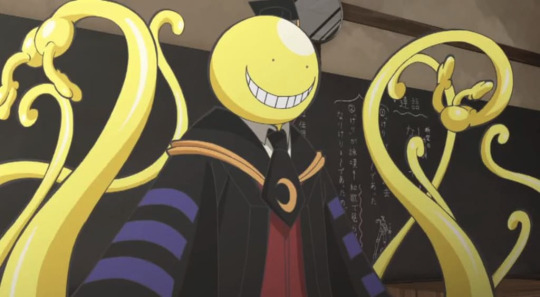
Instead of focusing on how to "defeat the opposition" the teacher does something that I really like. It uses the feeling of connection between the students. I have a feeling that the common goal of assassinating him has brought upon a unbreakable bond between all of the students, and he simply guides this to an objective instead of pumping information into their brains. He uses a lot of techniques such as experiential learning and even using the students for each other. Notice the juxtaposition, the principal pits the students against each other. Sure, hatred can guide one decently far, but if we view it from a logical perspective, teaching on another their best subject is by far more efficient. It is like a network rather than a one for all type of thing. It also instills a future love of learning.
Koro-sensei:
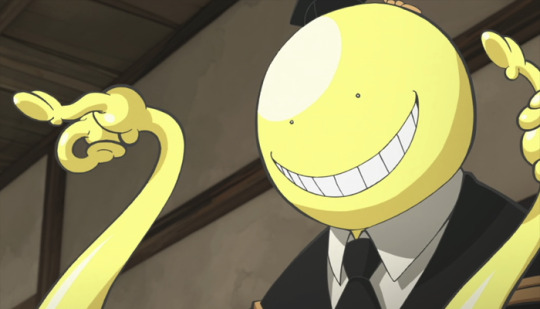
What is this thing? What is its ultimate objective? I haven't watched the full anime, but could it be trying to fix things on Earth for itself? Maybe it got tired of seeing the education system being so bad that it had to serve an ultimatum.
Overall, really interesting concept. I would love to keep watching it.

8/10
1 note
·
View note
Text
Wow, I never knew that Perfect Blue had hints to actual celebrities. And it's strange too, how you can see the resemblance between the two. Thank you for sharing this fact I otherwise probably never would have known about.
Kon: Perfect Blue
Addressing Global Issues/ Relating It Back To My Own Experience
Perception (Others vs. Oneself) and Third-Wave Feminism
This was quite a watch to say the least. While watching, two themes that popped out to me the most were: 1.) the difference in how others perceive us vs. how we perceive ourselves and 2.) female sexual liberation.

Throughout the film, Mima struggles with the way in which others around her continue to view her as a “pure idol”, despite undergoing a career change and becoming a “sexy actress.” Additionally, though she views her outward identity as a new actress trying to break-through in the harsh, entertainment industry, this also differs from her inner identity. The struggle of identities Mima faces as a young girl transitioning into womanhood combined with her job of putting up a “perfect” front as a celebrity provides at least a partial explanation as to why she begins to suffer from psychosis. Going off on a slight tangent, Perfect Blue was first released in 1997. By then, Japan had experienced two celebrity suicides. Both were female idols (Endō Yasuko and Okada Yukiko) who died by jumping off the roof of Sun Music building.* Their deaths were just ten days apart. These two incidents sent waves of shock throughout Japan, since the country was not yet familiar with the idea of suicide and could not have fathomed a “big name” – and two at that – to fall victim to suicide until that point.
youtube
As for the topic of female sexual liberation, the film critiques society’s teachings of values in that girls should be cordial and pure. While the film has a handful of sexual scenes, many of which can be triggering, the focus on the naked female body can be critically analyzed from the viewpoint of female sexual liberation and the feminism movement. Mima capitalizing on her body as a female, an object of frequent sexualization, is one example of arguments made by third-wave feminists in that sex work is an act of female empowerment and reclamation (i.e., a means to gain financial independence).
3 notes
·
View notes
Text
Perfect Blue
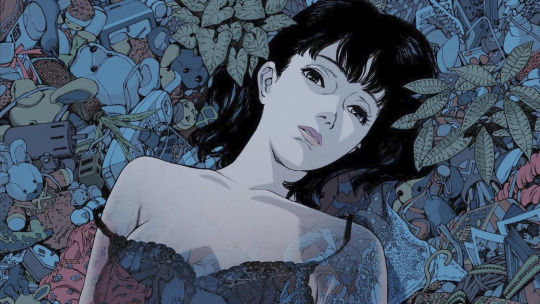
One of the key themes of the movie is the exploration of the dark side of fame and the entertainment industry. We see the protagonist, Mima Kirigoe, struggle to maintain her sense of identity and integrity as she transitions from being a pop idol to an actress. Her journey highlights the intense pressure and scrutiny that celebrities face, as well as the difficulty of navigating the blurred lines between reality and media-created personas.
The film also tackles issues such as the objectification and sexualization of women in the entertainment industry, as well as the dangerous consequences of obsessive fandom. Through Mima's experiences, we see how fans can become fixated on their idols to the point of delusion, blurring the boundaries between admiration and obsession.
One of the most impressive aspects of the movie is its use of nonlinear storytelling and surreal visuals to create a sense of disorientation and unease in the viewer. The film constantly keeps you guessing as to what is real and what is not, playing with your perceptions and expectations in a way that is both thrilling and unsettling.
The character of Mima herself is also a fascinating study in psychology, as we see her struggle to reconcile her public persona with her own sense of self. Through her hallucinations and nightmares, we get a glimpse into her deepest fears and desires, as well as the psychological toll that her career is taking on her.
Overall, I enjoyed the emotional rollercoaster, and the extreme unease along with the storytelling.

9/10
0 notes
Text
I definitely agree. But, also, I don't think that it's a possible reality. Powers will always fight with other powers to write with the pen of history, the stronger win, the weaker lose, and the petty use revisionist history manga as an outlet for what their story could've been.
Sensoron
☆☆☆☆☆
It seems as if the topic of war always comes with the justification of who was in the right. Sensoron tries to convince us Japan were the "good guys". But let me not word it like that, because the manga kind of goes to say that its not clear who the good or bad guys were. Sensoron's goal seems to be to paint Japan in a more positive light. We see their crimes being downplayed while other country's crimes are being portrayed more negatively. It makes me wonder the power media like this has to influence its audience. How many people pick up a piece of work like this and believe its narrative? The portrayals in Sensoron are based off a lot of misinformation, and for people who don't know history, is this something they'll be able to recognize? In the end, whatever message country's want to spread to justify their involvement in war. You're never truly going to have a "good" reason for participating and we just need to learn from history instead of covering it up through twisted truths and misinformation.
1 note
·
View note
Text
Sensōron
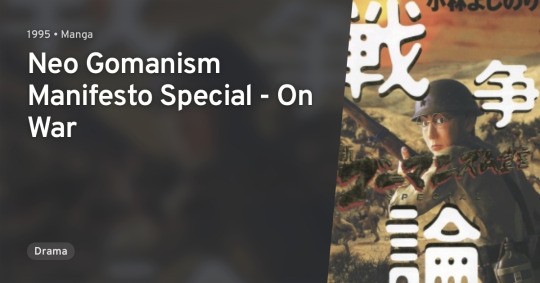
It is amazing how delusional people can be when you have the right mindset. I might not have the evidence with me on hand, but I believe that if I set out to disprove this guy's statements, with enough research, I thoroughly believe i could.
His research is flawed inherently because he does not view it from even a remotely objective stance. He is nitpicking the exact pieces of evidence that would grant him the most value in his argument in a sea where information is endless.
We could try and grant him that the evidence he does put out is true, and his arguments backing it are solid. But truthfully, the stance itself is just too skewed, and it looks at too little regarding the other sides. I mean, you could go on any singular website and it would say something different about the atrocities committed. This man is simply screaming into a void where nobody will listen.
Also, this seems like an attempt to revive the Japanese fascism of the war; it feels as if that they are trying to restore the people to a way of thinking where the Japanese are the destined rulers of the world because our Emperor Jimmu is a descendant of a god or something.
However, this reading is not without its values in my opinion. It let me see the other side of this conflict. All my life I've been seeing it from the Chinese/American standpoint, and it was very (refreshing? jolting?) to hear the extreme, far-right, fascist way of thinking about it.
Also, Kobayashi, if you're reading this, MacArthur made Japan his bee ai tee see aich for 10 years, stop crying about it like you cried about other people crying about testimonies and just accept what happened.
Overall, no.
0/10
2 notes
·
View notes
Text
I definitely agree with your contender about this being the favorite anime of the semester, what a beautiful film this is. And also, I was too immersed in the film to analyze it, if that makes sense. So about your analysis with traditionalism and modernism, I do agree with it to an extent, but we also have to see that Mitsuha's father was ostracized by her family for leaving the traditional and choosing the role of a modern politician. Conversely, the modern also views the traditional as crazy (the father specifically said that side of her is what caused her to speak crazy).
Your name
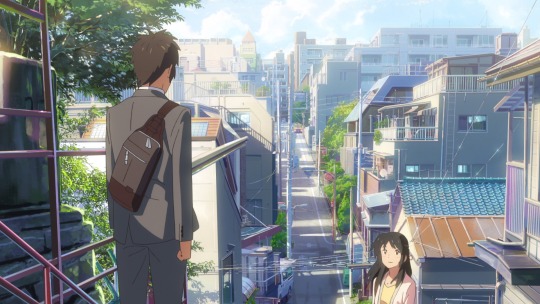
I think this anime is a top contender for my favorite anime of the semester.
The storytelling and visuals were beautiful… especially the ending! The ending had me HOOKED… it could have ended so many times and I would have had a totally different reaction to each end. I had to keep checking the time thingy to make sure the movie wasn’t ending just yet.
While watching the anime I felt like there were heavy themes of tradition and modernization.
Mitsuha lives a more traditional lifestyle, being raised in a small town where everyone knows everyone. Mitsuha feels trapped and wishes that she could live in the more modernized Tokyo. In Itomori, tradition is upheld in the form of a festival that happens every year. Mitsuha’s grandmother explains the traditional ideals, saying: “The meaning of our festivals became unknown and only the form live on. But even if words are lost, tradition should be handed down.” This is a very conservative way of thinking, in the sense that traditions (like the festival) are kept to conserve the culture of the past, even though modern-day partakers don’t even understand the significance.
On the flip side, Taki is living a modernized life in the big city of Tokyo. He gets to go to a big high school and works as a waiter in a restaurant. He has endless opportunities in the big city and isn’t constrained like Mitsuha is in her small town. More interestingly, Mitsuha specifically wishes to be a boy living in Tokyo when yelling out her frustrations, while Taki never expressed any disdain towards his city lifestyle.
These parallels could represent the conservative ideas of femininity and masculinity, being that the feminine role follows and respects tradition (ex. Traditional housewife and caretaker), while the masculine role is freer to adapt with modernization.
7 notes
·
View notes
Text
Your Name

About the Anime Itself:
I'm definitely a bit late to watching this anime, but I thought that the concept was innovative. Yes, I have seen body-swapping, gender-bending anime. Yes, I have seen anime where the manipulation of time was involved. Yes, I have seen anime where there was a deep love story. But I think that this movie combines it masterfully.
It kept you guessing from the start by swapping their bodies every so often, introducing it as a dream. It used this device to get the audience familiar with this setting, not to mention that their interactions are far and few, which keeps you wanting more, and then it took it away suddenly. This is the part that shocked me the most.
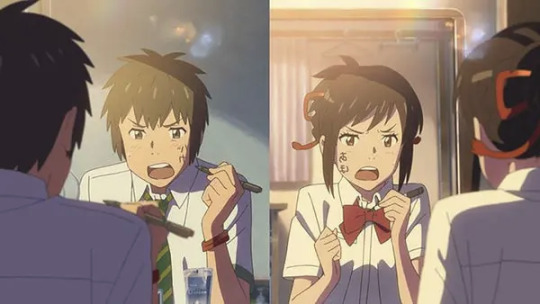
You find out that she had died, but he'd met him once, and they are using these dreams to remember each other in a way. There's just something so poetic about this device, it uses the romantic concept of "right person at the wrong time" so well to the extent that it just pulls and pulls at your heart strings. This time delay works so well in my opinion because it's so relatable to a general audience. Whether it be friends or romantic relationships, there's always something bound to not work simply because the two people are at different stages of their lives, and in this film, the stages are painfully clear. They are literally in different times.
Their Adaptations:

It's amazing how quickly the managed to coordinate to whole body-switching thing and how they laid down the rules for their "performances so quickly." Now, I'm sure that it has much to do with today's reading, but I tried reading that and I am completely lost. I'm going to go off the one fact that made sense to me: conditioning. Since they don't know how to perform each other's roles, which is different than their sexuality, they have to be conditioned by each other in order to have things seem like they never left the normative. We can see this first in things that are personal to themselves, but then we can see it in gendered form where they try to interact with their respective friends. It doesn't work out.
Overall, I absolutely adored this anime. I feel like I enjoyed the work so much in and of itself that I have little to think about the societal issues that it raised up currently. I especially respect the writers for being able to "give and take" perfectly with in the anime in order to keep it always interesting.
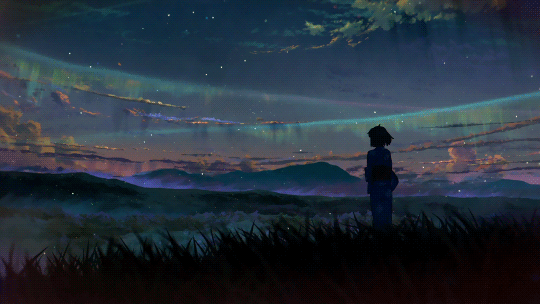
10/10
1 note
·
View note
Text
Say it louder for the people in the back
The bastardization in this show is just really disgusting. I completely agree with your statements, the way they slaughtered entire narratives written by history with a simple re-presentation was absolutely apalling.
Because behind the face of Germany:

Were monsters like:
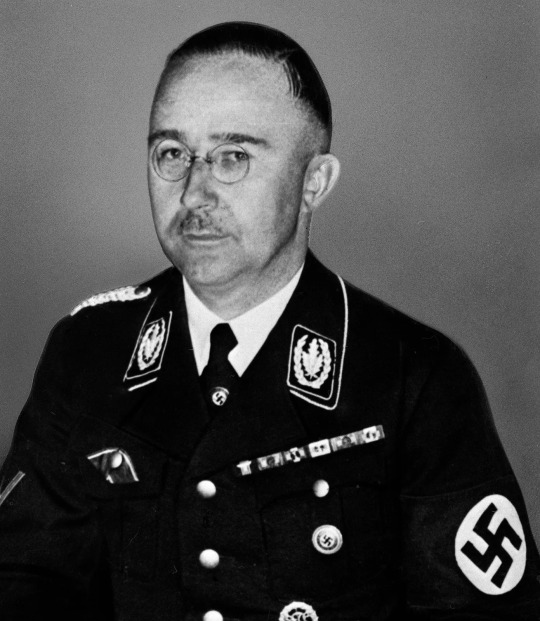
Himmler
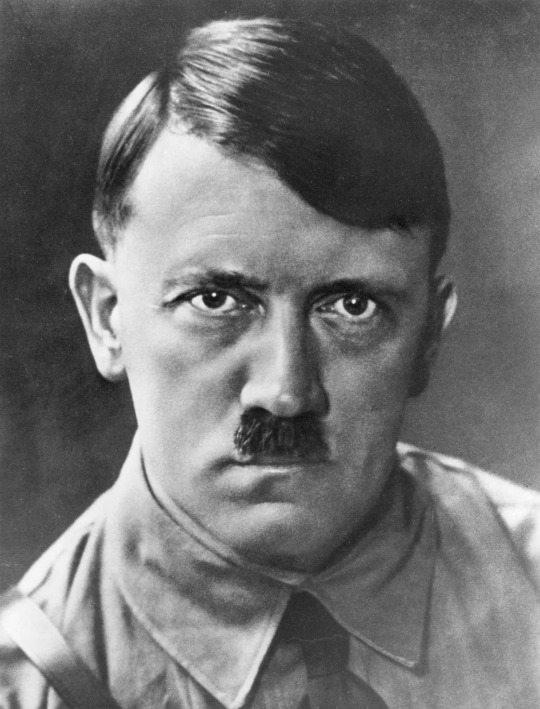
And this coward who shot himself in the head before he could suffer any consequences of his actions.
And for Italy?

The cute, pasta-loving fella?

This humpty dumpty looking who started fascism itself.
Japan, the voice of reason?
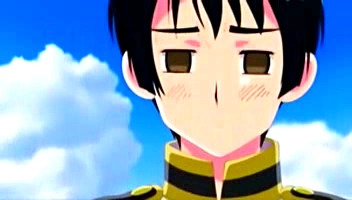
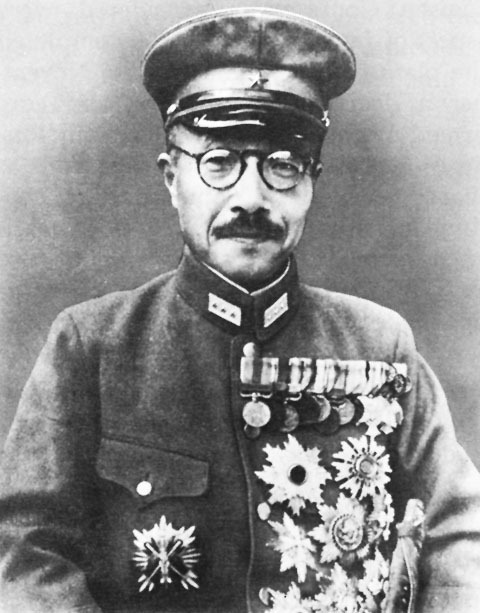
You got Hideki Tojo.
And I got one final bone to pick along with you on this one.
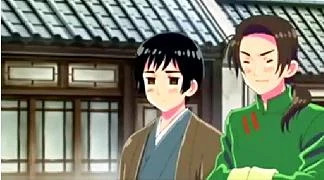
Why does the anime demonstrate Japan as an ambitious man seeking strength, while it depicts China as some simple-minded person who doesn't know what it means to procure greater strength, and would rather sit around to gawk at nature?
Also, a Wok and a ladle? Really?
I'm not into this fandom enough to understand the culture surrounding it, but just because of my knowledge of history and the anime itself, you can consider me signed out of this one.
Hell. No.
Hetalia
I cannot rate this with a good conscience ❤
I have autism and Hetalia is my special interest so this is literally 3k words long and I have absolutely no regrets. I could have gone on longer but I wanted to remain relevant to the class. If you don't reply to me I will cry.
I'm gonna break this into a few sections so you can skip around. I'm going to try and stick to just season 1 with this discussion, which won't be too hard cause it's the most insane one. Also, I just want to say that I wrote this all before I read the attached article and I'm now seeing that I literally could have written that article because I know everything about Hetalia.
When do we cross the line between stereotyping and just straight-up racism?
Hey, why are we idolizing WWII Germany?
Oh, we are portraying war as silly and funny, okay cool.
Is this Japanese Nationalism? (a surprisingly controversial argument)
The Sub and the Dub are 2 totally different shows
The Fandom (and linking back to other class-related terms)
Okay I'll name one good thing
Alright, let's get started.
1.
A lot of people will argue that Hetalia is not racist at all because they are making fun of everyone. If you are portraying all of the countries as their most common stereotypes then it evens out in the end. I would argue that this is in fact, not the case. Especially when you set your show during WWII. I will give Himaruya credit in that he mostly focuses on European countries to make fun of, making a lot of the stereotypes less so targeted at minorities. However, a lot of these jokes are still highly insensitive and frame some countries in a worse light than others
Just look at the difference between how Northern Italy is portrayed as opposed to Germany or Japan. Or how France is a predator, Belarus is into her literal brother, and Spain is seen as a creep. It is often times mocking an entire country's intelligence, appearance, or personality. While it is not always that serious, it does lead me to the second point.
When you personify a country and mock it, you aren't just mocking a piece of land, you are mocking an entire population of people. These jokes may seem harmless but they can still be hurtful. While I don't believe that liking Hetalia translates to your actual views on world events, it can unconsciously impact your real-life thoughts and behaviors.
(also why does Britain see imaginary magical creatures, what is that referencing? According to the wiki, it is some popular folklore story of a rabbit who lives on the moon but like.. what? If Himaruya was doing this much research into these countries' cultural backgrounds why is he portraying them like this?)
2.
This show portrays WWII Germany in too positive of a light for my liking. I've noticed a trend in anime where they seem to love Germany (or Germanic aesthetics) a lot (AOT I'm looking at you). Now I'm not well-versed in the interpersonal relationships between Japan and Germany, but the idolization is not it. The way that Japan in this show is portrayed as being literally obsessed with Germany is the biggest example (Italy is also shown having an immense appreciation for Germany and is often gushing about his positive qualities, even writing him a song while he was being kept prisoner). But I mean look at how Germany is portrayed, even his stereotypes are mostly positive, he is hardworking but helps out his fellow allies, makes great food, and is super strong. His only negative trait is that he sometimes doesn't understand social scenarios and that makes him very awkward. However, he will always go out of his way to try and better understand his friends (like Italy) by purchasing books to try and help him learn the appropriate way to act in scenarios).
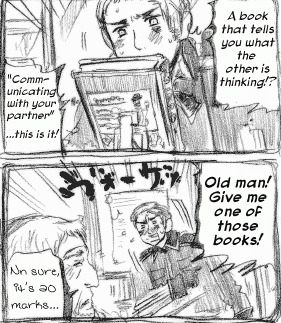
This is 10x worse in the dub but we will get there. When one of your main characters, the one you are portraying in the best light, is a literal war criminal hot anime boy, you can understand why I would be concerned. I mean they gave him the whole blonde hair blue eyed appearance like come on. Now I'm not going to go into depth on fandom or anything here but Hetalia knows that its demographic is young tweens (primarily girls) so how can you be surprised when this portrayal of Germany leads to WWII fanfics sympathizing with Germany and 14 y/o girls in German military uniforms doing questionable things. (also Germany becomes a canonically gay character in Hetalia in like season 4 or something and that just makes me so mad, like yeah, of course, the gay character is WWII Germany that so cool) (okay, I would like to clarify that technically Sweden is the only confirmed gay character. Sweden is bad representation though because he has one-sided feelings for Finland and makes him uncomfortable by constantly referring to him as his wife)
3.
I mean yeah, obviously this isn't going to be an accurate portrayal of history but some of this is just totally misinformation.
Austria invading Germany is literally just Austria annoying him in his house for a really long time. But also there's like actual wars... and like all of the events of WWI are canon... and like there are some really serious episodes
Also, we literally see a bunch of countries going to war personally, like fighting on the frontlines. Which to me confirms that these people are all literal murderers, like mass murderers lowkey.
Do you know how many weird USSR jokes there are throughout this? So many. Lithuania is pretty much just in a running gag where he keeps getting manipulated by Russia into coming back to live with him. (Yeah, there are so many USSR fics as well).
ALSO! why is the American revolution portrayed as the saddest thing to happen thus far, the storyline is stretched out from episodes 16-20 and it is all drastically different from the tone of the rest of the show. Britain is literally on his knees crying saying that he can't shoot America (which also implies these countries can physically harm/kill each other). Like that is the war you wanted to make all sad and sentimental? Why? Is this how Japanese people think that we view the Revolutionary war? Because that is a pretty inaccurate view.
Anyways back to the original point. Some historical events should not be played for laughs sometimes. It is incredibly disrespectful for actual victims of these tragedies to portray these events as funny or goofy.
Though I will give credit because Himaruya does make all sides of the war look like idiots who have no clue what they are doing, which is a sentiment I can get behind.
4.
As a both non-Japanese and non-Korean person I can not really give my opinion on this however I can share with you both sides of the argument. This is mostly in relation to the original comic strip, but has some relevance to the anime as well. I just wanted to bring it up because it is interesting to me. (This is briefly mentioned in the article but I wanted to expand on the argument).
You may or may not have noticed that there is no South Korea character in this show, however, there was in the original comic. In the comics, South Korea is a pervert who is constantly touching Japan and he also takes credit for the inventions of other countries. Now I'm obviously not going to go into the past history of these 2 countries because that would be incredibly long but the South Korean National Assembly reviewed Hetalia and determined that it was a "crime against South Koreans, akin to slander". So yeah, South Korean people were not happy with this portrayal and the character was inevitably removed from the anime before release. (This is a real picture of the South Korean National Assembly reviewed Hetalia, the corner shows South Korea groping Japan inappropriately)

There are two opposing views to the Japanese Nationalism take and I'll link them both (Belittling Japanese Nationalism Hetalia: Axis Powers is the title of the first one)
The first one pretty much argues that Hetalis is not Japanese nationalism because it paints Japan in just as negative of a light as all of the other countries, no one is left out of being made fun of. Japan is seen as socially awkward, emotionally repressed, and obsequious.
The second argues that Japan is often shown to be more intelligent than other characters as well as often being of the voice of reason (especially compared to China) and most of his negative attributes are not nearly as harmful as some others in Japan’s case, even his “negative” stereotypes are inoffensive, as they pose no threat of meiwaku.
I think we see in the dub that Americans are a little more willing to make fun of themselves. Though there are a few good Japan self digs, like the capitalism joke in one of the first episodes.
5.
Oh boy I've been waiting for this.
The dub is 10x more offensive than the sub. Most people consider it a crack dub.
So many of the jokes are rewritten that it is practically a different show. The sub is from a Japanese perspective and the dub is from an American perspective.
First of all the accents in the dub are so bad like it is actually atrocious. Japan is really annoying because not only is his voice stereotypical but he always says 'nani?' instead of 'what?' as if that is a normal thing that people do. The narrator is the best part of the dub and she is hilarious.
So I don't really feel comfortable even typing out the jokes here so if you want to hear them I included the time stamps for the three nazi jokes I remember in season 1 (the last two being worse).
Episode 1 (1:35:1:38)
Episode 7 (2:13-2:19)
Episode 48 (1:28-1:31)
Those are just a few examples and it gets worse. The dub literally had no reason to include these jokes because there is not even an insinuation of them in the sub and it makes literally everything a million times worse.
I will give the dub some credit for being so utterly ridiculous that it's funny. I will provide a few timestamps for the funniest jokes that only appear in the dub from the first 19 episodes (but I really recommend looking up Hetalia dub funny moments on youtube because some of them are really priceless):
Episode 13: (1:45-2:05)
Episode 14: (1:12-1:22)
Episode 17: (0:59-1:15) (2:06-2:11)
6.
Now I've had this post typed up for a bit and originally I wasn't going to talk about the fandom but after reading the article that he assigned (and going through the fandom unit), I see that there is a lot of reference to fandom in particular so I want to at least mention it.
Not the 2 biggest problems with the Hetalia fandom are racism and the fetishization of gay men.
As mentioned in the article, there have actually been multiple fan incidents of them dressing up in WWII German military uniforms Germany/Prussia cosplay, and standing in front of temples with fake guns or doing nazi salutes in convention photos (If we want to bring racism and fetishization of gay men together there were two people who kissed in a holocaust memorial museum in Italy and Germany cosplay... there is no picture of this so it might be a rumor but it was well-known so it is worth mentioning). There were also a lot of people using imperialist Japan flags in cosplay/fanart and writing incredibly inappropriate fanfiction about real-life events.
If you would like to see any of these incidents feel free to look up "Hetalia the Boston Incident" I don't really wanna include the photos here.
The fetishization is not unique to the Hetalia fandom, but it is amplified to the max. Obviously, within Hetalia, there are almost no female characters, so this leaves only male characters to be shipped with one another. Now suddenly Germany is an uwu gay bean and not an actual war criminal. At the moment of writing this Hetalia has 32105 M/M fics on ao3 which is only one of the three fanfiction sites, with ao3 not even becoming popularized until after the peak of the Hetalia fandom. (the most popular ship being America/England who refer to each other as brothers in the show as England raised America, showing another problematic part of the fandom). I would argue that Hetalia has one of the gayest fandoms (My Hero Academia is giving it a run for its money though) and I agree with the article that it is inaccurate to say that this is only done by straight cis women. The fact of the matter is a lot of queer teens used Hetalia as an outlet to express their own sexuality through these characters. The straight women that do fetishize BL are likely only doing so because anime creators suck at writing good female characters.
I think that the "level of gayness" turns straight fans away from watching the show (again MHA is the same way today) as it is hard to interact with the fandom without seeing some yaoi content. However, many people view this as something wrong or cringy, when in reality it is a normal part of fandom culture. When gay people have such little content that is actually gay, you cannot blame us for creating our own through characters that we like/relate to. Again, I think the only issues that arise here are the problematic ships that give young people a bad impression of relationships (abusive, incest, pedophilia, etc) or the arguable problematic ones like China/Russia or Lithuania/Russia as again these are real countries with real political relations. (However, I will never forget the time that there was Russia/China fanart on the news, maybe they approve and I shouldn't be complaining)

The thing is, Hetalia only seems so bad because the fandom is so large and so young. A lot of shows have fandoms that sexualize the characters and have kinda problematic fans, but the sheer volume makes things seem worse. This is something that we covered when we watched Genshiken, but there is a lot of negative stigma behind this fandom in particular, but it is just a loud minority that gets a lot of news coverage between fandoms.
It also raises the question "Is a show responsible for the response of its fans?"
Because while Himaruya has no control over what people do with his characters or how they interpret a plot, if a majority of people are leaving your show spouting vaguely racist rhetoric and interpreting your show one way, isn't there some validity in that interpretation? I think a creator has to be aware of their audience, which in this case is a very young and impressionable audience who might not understand how offensive some of the things they are doing really are. They don't hold the same ability to separate fiction from reality.
That being said Hetalia had a large impact on fandom culture as a whole, largely starting things like 'ask a character' panels (along with like homestuck but we don't talk about her). If you go to any convention you will probably find a Hetalia cosplayer, and if you watch any dub there is probably a voice actor from Hetalia there.
I also want to mention Hetalia is also a fandom full of cultural capital, If you don't know every niche fact, you're not a real fan, If you haven't read Auf Wiedersehen Sweetheart you haven't even met the entry-level requirements to be a fan. There are also no characters that are too sacred to be altered within the fandom. If you want to put Germany in a maid dress have at it, if you want to see all the characters as girls you're in luck cause Himaruya literally drew them. Fanfictions can take place anywhere from WWI to the present day and you can put any characters in any scenario and make it believable. There are thousands of pieces of fanwork, fan art, fangames, and fan AUs. These characters are malleable to fit your personal preference and there is really no way you could be mad at this as Himaruya does this himself, with no real established canon.
a Hetalia fan once said, "No one cares if Hetalia was written by a Japenese Imperialism apologist when you're 31 chapters deep into a human Au soulmate fic about Austria inviting Prussia to see his boyband perform in Berlin"
Himaruya is also the king of moe characteristics because he turned these Hetalia men into any cute thing he could think of, Chibi versions (Chibitalia), female versions (Nyotalia), and cat versions (Nekotalia). He has no reservations about drawing the characters in a dress or in cat ears. He gave the characters human names to allow for more standardized human AU's and made a DS dating game. He encourages fans to take his characters and use them in their fanworks as they see fit, canon is up to interpretation itself. I think Himaruya himself was a huge part of fandom culture (not that I could tell you cause no one knows anything about the guy) and saw how the female characters were often treated by fans and turned it on its head, allowing for females to sexualize the males this time.
Also, none of the male characters in this show resembles a Hegemonic form of masculinity. Even the most masculine character in the show (Germany) can be seen doing more "feminine things" like wearing a dress or proposing to a man. Which, you know, I guess is a good diversion from things you would typically see in an anime of this nature (but again there are a lot of instances of characters being feminine being played for laughs, like a man being girly is something inherently funny). Feat. Germany proposing to Italy with a tomato ring.

7.
I am Hetalia's biggest hater, however, I cannot deny the impact that it has had on my life and how much I love to talk about it. Hetalia is what introduced me to anime and fandom (and tumblr) for the first time. I met a lot of people I still talk to today because of this show. It encouraged me and a lot of other people to actually get interested in history. Thanks to this show I can identify every country in Europe, and it was a lot easier to remember historical facts if I just imagined the Hetalia characters. Also, Auf Wiedersehen Sweetheart is a literary masterpiece and there is a reason it almost has a five-star rating on goodnotes (https://www.goodreads.com/en/book/show/22064556) I love you George DeValier I hope you're doing good wherever you are.
I would like to make it abundantly clear that despite everything I've said that might make me sound like a woke blue-haired liberal, I don't really think this show is some horribly racist show or that the people who enjoy it are racist. I just wanted to provide a deeper outlook on the impact a seemingly dumb show can have on real people. I can't really blame the show for the terrible response of the fandom and it did honestly get better in later seasons that are not focused on WWII.
Despite all the bad stuff, it is a relatively funny little 5-minute watch, and you can really just jump in at any point you want to. If you don't take it as seriously as I do you might even enjoy it a little.
If you actually read this far I have major respect for you, I'm really excited to see what the general consensus on this show is.

Prussia and South Italy were my favorites in case anyone cared
If you're wondering why I didn't do my presentation on Hetalia despite my extensive knowledge, it is because I would be incredibly biased and I would go off the rails I think.
Also, my biggest fear is current Hetalia fans finding this and killing me, that might seem irrational but the Gundam fans found me last time so I wouldn't put it past them.
33 notes
·
View notes
Text
Hetalia: Axis Powers
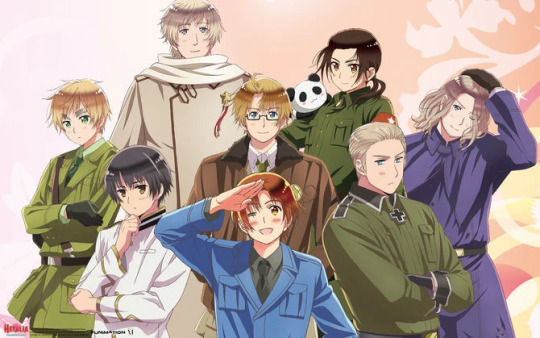
I have a lot of criticisms about this.
Loss of the Grand Narrative:
First and foremost, the loss of the grand narrative. It's to the point where it doesn't make sense anymore. While the grand narrative had its flaws, such as the legitimation of power, this taking random stuff from a data base and throwing it onto the screen just simply doesn't make any sense whatsoever. For example, the nation's soul being condensed into a character with an authorially ascribed personality? I mean, maybe I'm reading in too much into this, but who is one person to represent an entire nation's history through a personality that they seem the best fit for it? Additionally, what is the relationship between these characters and their famous historical figures associated with it. For example, with France, it also depicts Napoleon as having some role in the equation. Does this mean that Napoleon exists in some weird supporting bubble just to have the story make the minimal amount of sense?
I really don't understand.
Bastardization:

This has got to be the most prominent example.
While I get the notion that all of these countries are condensed in a way that pokes fun at them all equally, I just can't help but feel that some of them are more bastardized than others.
Take: Italy.
I was expecting some extreme supervillain transformation for the WWII segment, right? Nope. They kept him as a hedonistic, pleasure-seeking, pasta-loving sheep. Which, in my opinion, gives no justice to Italy whatsoever. Because while Italy was as weak as they depicted it in the war within the anime, by no means should Italy have been that weak from the very beginning.
I mean, Mussolini quite literally started the whole right-wing fascism movement that diffused to Germany later on, so I feel as though there should be some respect given to the situation given the consequences of the events that happened afterwards.
To make things fair, though, I would like to restate that all of them are bastardized to an extent.

America: always eating hamburgers, wanting to be the hero
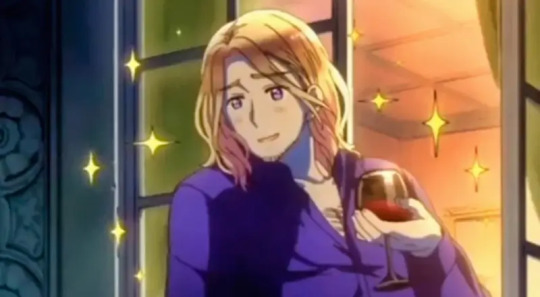
France: super showy, romantic, always reminiscing about how great they were before the great war
These are just some examples.
Overall, I might be missing the point here, that's okay, I'm still human. But, besides turning off my history brain and trying to enjoy this as a dumb slice of life, I can't really find myself to enjoy this simply because of how much they try to condense hundreds of years worth of information into a single person, whilst adding perhaps Moe elements as an attempt to make it more appealing.

Also, can't help but sense that this is an attempt by an author to redirect history's attention, to maybe redirect that the Tripartite, instead of being a pact between three fascist countries trying to take over the world, was just three dudes hanging around a campfire rambling about sausages, pasta, and a "we'll think about it."
And absolutely no war crimes were committed, right?
3/10.
4 notes
·
View notes
Text
I also like the last point you made. Imagine falling in love so genuinely for an infinite amount of times and not being able to remember it. Although he did do some questionable things, it's hard at times not to feel for characters such at Jin.
Xenoblade Chronicles
I don’t quite understand what is going on in this Xenoblade Chronicles playlist… maybe I just need more context, but it’s like I understand, loosely, of what’s going on but the true details and makeup of this world, I don’t understand. But, what I can gather is the importance of the environment in this world because the environment holds an effect on their powers. Moreover, harmony with the environment is important to everyone, especially when it comes to human relations with the Titans. When I noticed this, I immediately thought of Nausicaa of the Valley of the Wind due to the importance and correlation between being cognizant and taking care of the world they call home. The Titans in Xenoblades are these giant beings who the people rely on to stay afloat in their dwindling realm, which ties into the reading about anthropocene, the age of human influence on the earth. There’s irony though, in the fact that homosapiens are regarded as exceptions to the natural laws that nature itself abides by. Yet, in the Xenoblade realm that exception, or excuse, to go against nature’s ways, ends up biting the populace’s butt as they navigate their diminishing world and must learn to survive in the consequence of taking advantage of the earth. As the reading states, every species has to adapt to its environment. I could even go as far as referring to the Charles Darwin experiment that discovered “survival of the fittest”, but I won’t because we’re aware of that. Adapting and change are words that this realm is familiar with, especially when looking back at the rebirth of the swords and crystals who are portrayed as very human-like. These swords of power and light are in a cycle of immortality and being able to die, but have no recollection of who or what they did before. I find this trope interesting because it’s almost sad but intriguing to go one for multiple lifetimes but not recall any unless circumstances force them to.
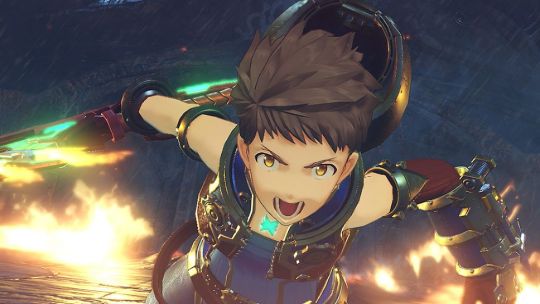
7 notes
·
View notes
Text
Xenoblade Chronicles 2
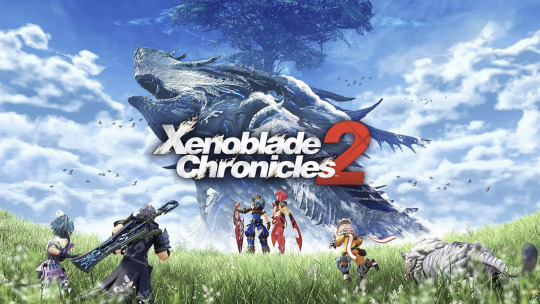
The Expression of a Video Game:
Anime and video games are two different mediums. Anime only makes use of limited animation, or even if it uses full animation, it could not ever render frames in such frequent intervals like 60fps. So, this opens up for a lot of extra room to have story-telling by action rather than dialogue. And it really does show, the scenes and camera movement seemed a lot more dynamic than you would find in anime. I just overall found this very interesting.
Blades Vs. Humans:
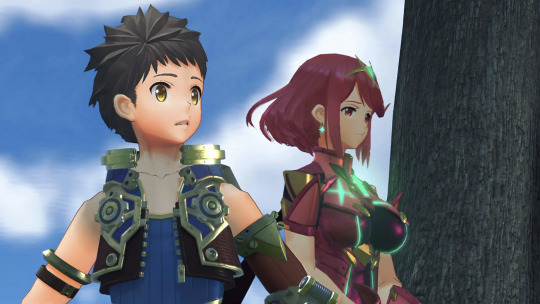
It seems that humans are jealous of the things that Blades want, and Blades want the things that humans take for granted. For example, blades can essentially live forever, but they do not want to live forever, they forget the past memories they made, and the way that this works makes everything a little less meaningful. However, since humans only have one life, everything has a meaning. And even though that humans die, they get to pass their generational knowledge down because they can remember, the blades cannot. In a way, the blades are more chained down by their limitations than humans.
Xenoblade Chronicles Vs. SAO:

I noticed a lot of parallels between the two works. First of all, I feel as though there is an "ascension" need, in order to find who is the controller of the world, and in order to get rid of them. They also have an aspect where there is a creator, and he's a power, all knowing being who controls all. Not to mention, once the creator is defeated, they all flash to a desolate sky/ocean only type scenery. These parallels just make me wonder, even though they have different messages, are they inspired off of one another?
Deep Ecology:

I feel as though that this makes sense. In the spectrum of deep ecology, humans care more about what matters to them, so they wouldn't make the sacrifice in the end to restore the world. However, blades which are more part inorganic matter, part biological replication, they understand the needs of non-living things, so at the end someone like Pyra steps up and gives the humans and the living creatures one more chance to inhabit it, because only will they understand a pragmatic version of Deep Ecology, will things prosper for humans.
Overall, I enjoyed this medium a lot. I always preferred more dynamic animations vs. more dialogue.
Also, the music is banger.
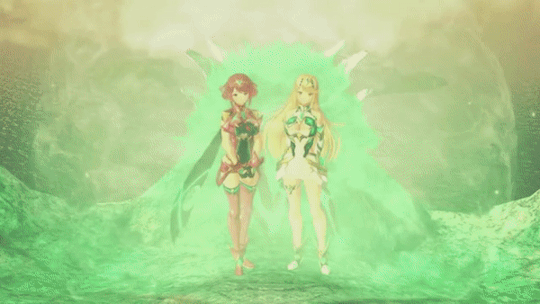
8/10
4 notes
·
View notes
Text
I think that it's insightful that you pointed out that this was more of what a humanity's future could be, rather than what it actually is. It shows that if we don't take care of the cards that were dealt to us, we could end up dying in an inhospitable Earth. However, the same cards also tell us that if we take care of the Earth instead, then we will raise many generations to come.
4/2 - Nausicaa of the Valley of the Wind
I went into Nausicaa of the Valley of Wind with the expectation that is would be a film about environmentalism to some degree, as had been alluded to in class. In watching it, I found this to be somewhat the case, as much of the movie hinges around this theme - not only in its setting, but through its major plot elements and overarching motifs.
It is plain to see the environmental undertones of Nausicaa from the start of the movie - as a result of immense conflict, the Toxic Jungle was created, the setting in which the movie takes place. The transformation of a previously habitable area into a much more hostile environment where life quite literally cannot sustain itself is a pretty clear-cut allegory for pollution. This theme is further compounded upon by Nausicaa's findings relating to the plants in the Toxic Jungle, in which the plants grown under normal conditions are fine but those grown under toxic conditions are toxic. I choose to interpret this as a warning against the consequences of pollution - though the pollution itself is a detriment, it goes to show the ramifications on other elements of the environment that it can cause as well.
It is easy to see how these themes made it into Nausicaa, especially considering the real-world inspiration for Hayao Miyazaki's work on the film: mercury poisoning of Minamata Bay and the environment's response. After having researched the film and having this context for its production, it is certain that Nausicaa promotes an anti-pollution and pro-environmentalist message, while also commenting on the dangers of greed, fear, and conflict as a whole. I believe this film also bears a message of hope for the future, as the movie ends on the growth of a non-toxic tree in the Toxic Jungle, signifying that regrowth and recovery is possible.

4 notes
·
View notes
Text
Nausicaä of the Valley of the Wind
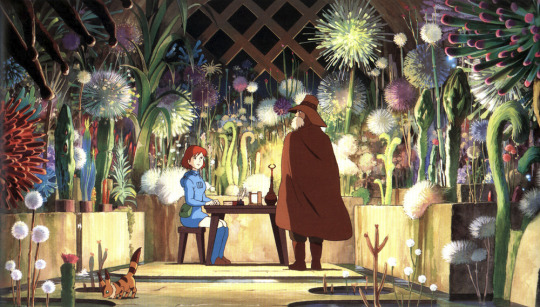
Nature and Militarism:
It seems like our solution for solving the issue of climate change is to fight it. However, this film made by Miyazaki is stating the other argument. In order to stop climate change, we must cooperate with nature. Instead of finding artificial methods to stop this, one must accept that nature is the determinant of all, and must learn to nurture nature.
In addition to the nature aspect, we also have the opposite standpoint to consider: militarism.

Notice how the nation most against the creatures of the Sea of Decay, Torumekia, were also the weakest ones. They boast huge aircrafts, show mights of militaristic force, yet at the end of the day in actual combat, they are weak. This brutalist, what is essentially the epitome of man-made architecture, approach proves to be its weakest at nature's wrath. First, many of their ships were downed by the Valley, which are a more nature friendly nation. Second, their approach is also deeply flawed, with him simply resorting to a simple demonstration of force. To them, the world is black and white, either there is an enemy or there is not. They do not care about the consequences of actions, therefore they are too blind to see that their enemy is a product of them, and the underlying enemy actually contains the spring of life.
God Warriors:

I feel as though the existence of this creature can go one of two ways.
One: This creature is to reaffirm the notion that no matter what powerful weapon humanity may use to overcome nature, it will never be enough, because if we don't end up destroying nature, we will destroy ourselves.
Second: There could be a solution to this issue, but we do not have it. We try to solve it using the "brute force" method too early, and we will suffer the consequences.
To Suffer:

I find it so unfair that Nausicaa, the one who actually tried to understand nature the most had to the suffer the wrath of it. She was such a devoted pacifist, and made sure not to jump to any conclusions before finding out the root of the reason. I think it shows that there will always be some that have to suffer in order to keep us alive on this Earth. If not one person, then all of humanity will suffer, but if there is such a pure-hearted philanthropist, then they will have to be the ones to suffer.
But life isn't fair, yet I still find this extremely unfair.
The most benevolent suffer the tolls of the most malevolent.
It really does make me feel more sympathetic towards all of Nausicaa's efforts in understanding nature, where it would have been so much easier to take the other route, the violence route.
(If they had kept her dead without resurrecting her, I really would have been fuming.)
Overall, I really enjoyed the film and the messages it brought. Not to mention, it's Hayao Miyazaki so it makes sense that the movie would be intensely nature themed.
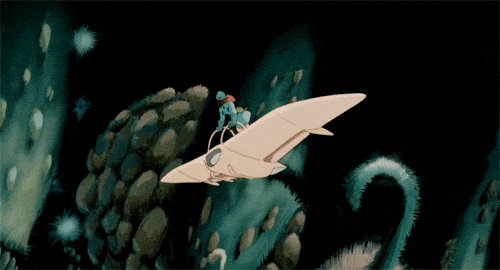
9/10
1 note
·
View note
Text
I would dare say like father like son. There's a sense of generational pain that you see in our culture today. The dad receives some pain within his lifetime and, unintentionally or not, inflicts it upon the children. It's a shame, I feel as though a lot of Shinji's issues could have been avoided if they were more communicative of this issue upfront. But that wouldn't have made as good of a show though, would it?
End of Evangelion
This film said a lot and nothing at the same time—is what I am guessing many people are thinking. I too am confused as one who is rewatching.
We have to start with the hospital scene, which has many interpretations. Within the framework of the series, I believe Shinji does it because it is something he would not do if Asuka were awake, let alone anyone with a working brain. It all plays into the film’s main message of humans not truly understanding one another. Shinji in the hospital room is one side of him that he would not—hopefully—actively express to others, something beyond the facade of himself.
In particular, when Shinji decides to merge everyone’s soul into one, he still finds it painful because he expects everyone to be the same as him. It is suggesting that complete understanding will not solve the fundamental pain underlying human connection. Obviously, everyone will have different perspectives and beliefs, so it is arrogant for Shinji to hope for someone who is similar to him instead of attempting to connect with different people.
A surprising (not really) reveal was that Gendo left Shinji because he thought his presence only hurt Shinji. After he lost Yui, he truly believed no one else would love him, thus isolating himself from everyone. Of course, Shinji, as a child, would not understand this, so he perceives this as no one needing him anymore. Overall, it is an unfortunate situation where self-love was critically lacking.
About the 3rd Impact, we can see that, at least where Shinji and Asuka are, the world is in ruins and the sea level appears to have risen significantly. The 3rd Impact could be alluding to Mother Nature’s wrath. In that moment, the fact that only Shinji and Asuka have the will to live on in reality suggests they are willing to rebuild after the earth’s destruction. It could also be a critique of the old generation because they are not seen to come back from the LCL, only leaving an almost uninhabitable future for the younger generation.
Everyone should watch the Rebuilds…
(btw listen to Komm Süsser Tod)

6 notes
·
View notes
Text
The End of Evangelion

The End:
I want to talk about near the end of the movie, where Shinji is faced with the decision whether to save all of humanity or to kill everybody. At first, his thoughts lead him to feel that none of what he has done was worth it, and nobody likes him, which leads to a vengeful conclusion about how he does not want anyone to live.
This is not what he truly wants though. It is the feeling of that nobody likes him that led him to come to that conclusion. So, if I'm not mistaken, Rei gives him the solution that he sought all along: to lower everyone's hearts, so that he could always know exactly what they are thinking. They have merged into one; they have experienced ego death.
However, a human, a mortal, should not ever experience the opportunity to become "god." It's simply because humans weren't meant to be gods in the first place. A god is omnipotent, it knows all and it sees all. But if you place a human in that role, all-knowing of the thoughts one should not ever know about, it is a set recipe for disaster. A human is meant to be independent to another human, because their thoughts are exclusive to their own. These facts are naturally determined by the endowment of our physical bodies. There are certain things that will always be separate.
Shinji and Asuka

The relationship between these two are very complicated.
It seems that Asuka, as a woman, expects a man like Shinji to be able to step in the right moments in order to "save the day," even though she is the one demonstrating more hegemonic masculinity.
However, Shinji, again, demonstrates the queer masculinity. Nobody actually realizes the fact that he's the one that actually needs saving. He needs saving due to the fact that he is constantly trapped in a struggle with his emotional labyrinth. And he sees Asuka as the solution because she is the one that demonstrates Shinij's supposedly more accepted social gender role more than himself.

It's sad how pathetic Shinji can be at times.
His inability to accept that anybody likes him causes him to push those away that cannot hurt him even if he doesn't know it, and only when he is sure that they are in a state of unconsciousness, he takes his pleasure out on them by using them as an object.
This only furthers the notion that Shinji does not have the proper facilities to foster any sort of relationship at all.
I also liked the fact that the creator of Evangelion made it this way, so we can see what a little person will do with big power; it was a good concept to see the character struggle with themselves more than the supposedly "actual problem."
Overall, extremely confusing anime, but I appreciated that it depicted a mental struggle, not to mention that the sudden jump-cuts were really cool for telling a story.
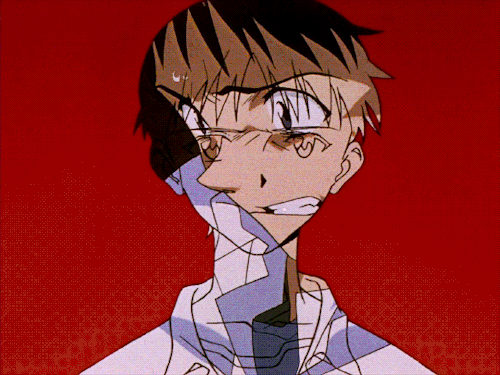
9/10
1 note
·
View note
Text
Wow, this is such an insightful analysis. I never thought of it, but now that you bring it up, could he be also performing for us, the audience as well? He's always talking to himself about hatred, but could he, in a way, also be talking to us?
Anno: Neon Genesis Evangelion (Ep. 8, 16, 24, 26)
Addressing Global Issues/ Relating It Back To My Own Experience
Loss of Self: Unseen Effects of War
To preface, I was really worried when I heard that Episode 26 has a reputation for being quite confusing. Watching Evangelion has been really slow for me, as I do not really like it much. *Except for the opening song. I love the opening song.* Anyway, out of all the episodes we’ve watched for this show, I liked Episode 26 the most. For me, it pulled everything together in that Shinji was able to finally come to terms with himself and his relationship with not only his father but also those around him.
Throughout the assigned episodes and especially episode 24, we see how detrimental war is on people, especially children. Huge emphasis is placed on the State. Everything should be done for the greater good: the State’s success. People become merely a tool for the State to wield, and people’s worth are determined by the value they hold for the State. As such, one’s individuality is repressed and their value is reduced to mere statistics, resulting in many to struggle with their identity.
Here, I want to introduce the content of a TikTok video I saw through Instagram reels, as I was putting off doing any form of school-work. Who knew my “short” break would actually become helpful and not a waste of time?
In the video, the girl shares her therapist’s advice when she revealed that she doesn’t feel like she has feelings. What she means by this is she cannot seem to access her feeling when she is by herself, but is able to share her feelings when others are around. According to her therapist, she has the tendency to intellectualize her feelings, in order to let those around know that she is ok. As such, she does not feel to gain connection, but is rather performing the feeling of the feelings. Meaning, she dissociates performatively when around others. Therefore, when she is alone, she feels that she has no feelings; because she still dissociates but has nothing to perform for.
I found this quite interesting. Perhaps, this gives a partial explanation as to why Shinji has trouble with his own identity. He does not know who he is, because he performs for others. So, when he enters the “empty world” in which he is given the freedom to create his own story, he does not know what to do. It is only when he starts to feel for himself – and himself only – that he is “freed” from relying on others’ perception of him to make sense of who he is.

5 notes
·
View notes